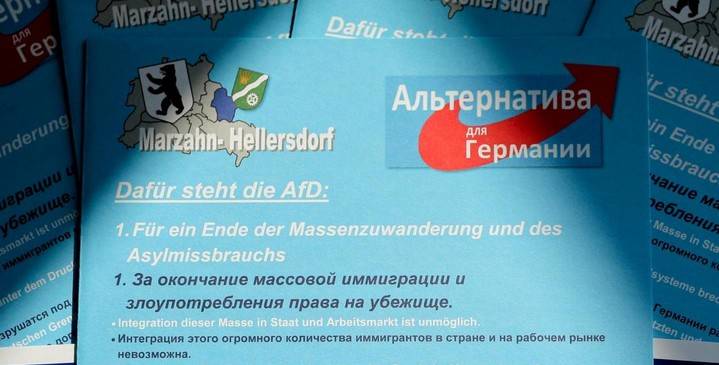Russian propaganda in Germany: it is not for the Germans

Nikolai Klimenyuk (Nikolai Klimeniouk) in the German newspaper «Die Welt» spoke about the so-called German minority, which does not want to be a minority. Author 47 years old, he was born in Sevastopol, worked as the editor of the magazine "Forbes Russia", and since 2014, he lives in Berlin.
After the scandal with the girl Lisa and in anticipation of the election, the Russians were again in the spotlight in Germany. Most of them have such increased attention, “of course they don’t like it,” the author writes, because “as a rule, increased attention is connected with prejudice,” where discrimination, mistrust, and xenophobia come from. The roots of all this are known: in the 1990s, more than two million ethnic Germans returned from the republics of the former Soviet Union to the Federal Republic of Germany, they were considered "uneducated, criminal, difficult to integrate people", whose support would become "a burden that will lie on the social system." In principle, this is "the usual attitude towards all immigrants from poorer countries." And there was something worse: they continued to be considered not Germans, but Russians: they were “held for Russians”, although they expected a warmer reception at their historical homeland.
The Alternative for Germany Party (AfD) wants to use these problems and the cultural heritage that the repatriates brought with them. Professor Achim Görres has calculated that about 15-20% of migrants support AfD. This, as can be seen, is far from being the majority. Nevertheless, it is indisputable that this particular party is the only recognizable party where the Russian Germans are represented.
As for the scandalous “case of Liza”, then, Klimenyuk notes, it would be “naive” to look at him as a provocation planned by Russia. It is hard to believe that this propaganda was addressed to the Russian-speaking diaspora in Germany in order to influence its electoral behavior.
The propaganda messages about the “decline of the West” are primarily addressed to the Russian audience in Germany. This promise also reaches the Russian-speaking citizens of Germany. In general, such propaganda is consistent with the myths of “Alternatives for Germany”: Germany is an “occupied country”, Merkel is an “American puppet”, Muslim migrants are about to “flood” the whole of Germany and Europe. The country must "break free from the yoke."
In Russia, the author recalls, AfD is reported "in a positive way," party activists even "appear on the talk show as experts."
From the material, we can add, we can conclude: Russian propaganda about the “decline of the West” and German problems was not originally addressed to the Germans, or even to Russian-speaking repatriates or other migrants who know Russian. Most propaganda is directed inside Russia itself. Her goal - viewers and listeners from Russia. At the same time, propaganda also has recipients in Germany, but it is impossible to name this large audience.
- especially for topwar.ru
Information